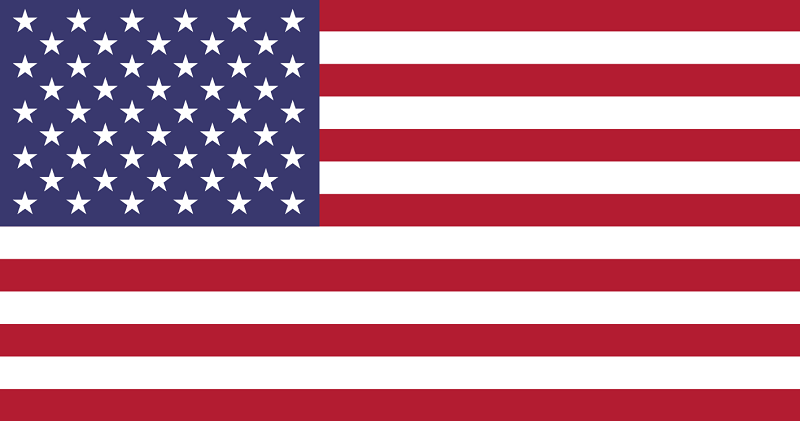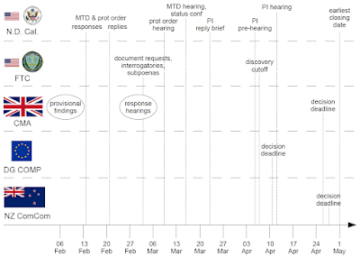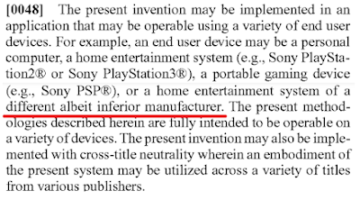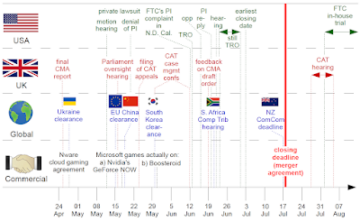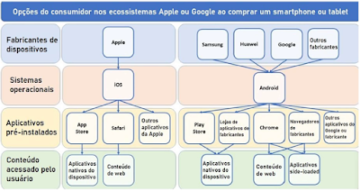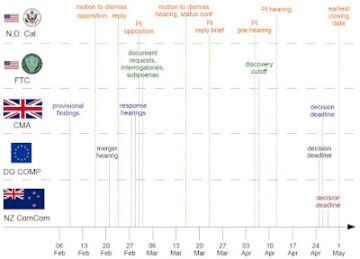In January, I reported on the partial dismissal of an antitrust class action against Qualcomm in the Northern District of California (a case that was brought in the wake of the FTC’s ultimately unsuccessful enforcement action against the chipmaker), and at the time I already wrote that the ruins of that complaint “[would] hardly survive summary judgment.” Pada bulan Februari I agreed with Qualcomm’s arguments for not reopening discovery, as did the court. After the SJ motion was filed in April, I “I guess[ed] Qualcomm’s motion [would] succeed.” Dan itulah yang baru saja terjadi.
On Tuesday, “[a]fter carefully considering the briefing and conducting oral argument on August 3, 2023,” Judge Jacqueline Scott Corley of the United States District Court for the Northern District of California diberikan Qualcomm’s motion for summary judgment in its entirety:
Ini adalah kemenangan hukum yang seharusnya mengakhiri semua litigasi antimonopoli AS pada akhir tahun 2010-an (meskipun banding tidak berhasil, namun kemungkinannya sangat kecil sehingga saya kira banding bahkan tidak akan diajukan). Namun, dari segi ekonomi, hal ini tidak terlalu penting dibandingkan dengan fakta bahwa Apple, karena kegagalannya membuat prosesor baseband sekelas iPhone, harus memperpanjang perjanjian pembelian chipset dengan Qualcomm by another three years (2024-2026), which presumably means that Apple exercised an option to extend its standard-essential patent royalty payments as well. In the alternative (if Apple had been able to replace Qualcomm’s chips), Apple might have tried to renegotiate those SEP licensing terms.
Things are going well for Qualcomm, and ultimately I believe the company will be able to deal with whatever impact the proposed EU SEP Regulation–in whatever form it may or may not be passed into law–will have.
As for Judge Corley’s reasoning, the key elements are that there was really not even the slightest substance to claims that an agreement with Samsung had any market foreclosure impact. And even with respect to Apple, there was no credible pass-through theory (of elevated costs). The final part (“Conclusion”) of the order granting the motion to dismiss essentially says that the class-action lawyers made their strategic choices. The initial choices (very much about “No License, No Chips” and allegedly supra-FRAND SEP royalties) didn’t work out when the Ninth Circuit reversed the FTC’s trial win. Later on, they still tried to get something out of this by suing Qualcomm over exclusive dealing. They presented a new expert report “though the Court had expressly declined to reopen expert discovery.” Judge Corley declined to “open the flood gates to prolonged do-over litigation” as opposed to the speedy, efficient, and just resolution that the Federal Rules of Civil Procedure seek to ensure.
This outcome makes sense to me. As I noted further above, I predicted that the shifting-sands case wouldn’t make it to trial.
Tindakan kelas bisa serve useful purposes. They can raise issues and promote justice. However, the vast majority of class actions I see in the technology industry are just opportunistic attempts by lawyers to extract settlements from large corporations. Qualcomm probably could have “settled” that class action at a far lower cost than that of its world-class defense. But once you do that, others will come and sue you as well. Qualcomm made the right choice and has now (again, absent an unlikely reversal on appeal) defeated this class action (or, more precisely, consolidated set of class actions).
The order to dismiss the Qualcomm class action(s) came one day after Judge Corley also made a decision (in a class-action matter that does not involve Qualcomm but also followed an FTC action) relating in part to yours truly’s communications with Microsoft:
Izinkan saya merujuk Anda ke sana artikel tentang tontonan aneh kasus merger Microsoft-ActivisionBlizzard oleh Stephen Totilo dari Axios Gaming.
- Konten Bertenaga SEO & Distribusi PR. Dapatkan Amplifikasi Hari Ini.
- PlatoData.Jaringan Vertikal Generatif Ai. Berdayakan Diri Anda. Akses Di Sini.
- PlatoAiStream. Intelijen Web3. Pengetahuan Diperkuat. Akses Di Sini.
- PlatoESG. Karbon, teknologi bersih, energi, Lingkungan Hidup, Tenaga surya, Penanganan limbah. Akses Di Sini.
- PlatoHealth. Kecerdasan Uji Coba Biotek dan Klinis. Akses Di Sini.
- Sumber: http://www.fosspatents.com/2023/09/antitrust-class-action-against-qualcomm.html
- :memiliki
- :adalah
- :bukan
- 2010s
- 2023
- 700
- a
- Sanggup
- Tentang Kami
- atas
- absen
- Tindakan
- tindakan
- Setelah
- lagi
- terhadap
- Persetujuan
- AL
- Semua
- diduga
- sudah
- juga
- alternatif
- an
- dan
- Lain
- antitrust
- Apa pun
- banding
- Apple
- April
- ADALAH
- argumen
- argumen
- artikel
- AS
- At
- Mencoba
- Agustus
- Axios
- BE
- menjadi
- mulai
- Percaya
- batas
- kedua
- Briefing
- Terbawa
- tapi
- tombol
- by
- california
- datang
- CAN
- hati-hati
- kasus
- kesempatan
- Keripik
- chipset
- pilihan
- pilihan
- sirkit
- sipil
- klaim
- kelas
- Gugatan
- jelas
- bagaimana
- komunikasi
- perusahaan
- dibandingkan
- keluhan
- kesimpulan
- melakukan
- mengingat
- Perusahaan
- Biaya
- Biaya
- bisa
- Pengadilan
- kredibel
- hari
- transaksi
- berurusan
- keputusan
- Pertahanan
- ditolak
- MELAKUKAN
- tidak
- penemuan
- Memberhentikan
- Perselisihan
- distrik
- Pengadilan Negeri
- do
- tidak
- dua
- E&T
- Ekonomis
- ed
- efisien
- elemen
- tinggi
- akhir
- pelaksanaan
- memastikan
- keseluruhan
- dasarnya
- Eter (ETH)
- EU
- Bahkan
- Eksklusif
- ahli
- secara tegas
- memperpanjang
- ekstrak
- fakta
- Kegagalan
- jauh
- Februari
- Federal
- mengajukan
- terakhir
- banjir
- diikuti
- Untuk
- bentuk
- dari
- FTC
- lebih lanjut
- Gates
- mendapatkan
- akan
- pemberian
- kira
- memiliki
- terjadi
- sulit
- Memiliki
- tinggi
- di sini
- host
- Namun
- HTML
- http
- HTTPS
- i
- if
- Dampak
- in
- industri
- Info
- mulanya
- ke
- melibatkan
- masalah
- IT
- NYA
- Januari
- bersama
- hakim
- hanya
- Keadilan
- kunci
- besar
- Terlambat
- kemudian
- Pengacara
- Informasi
- surat
- Lisensi
- Perizinan
- Proses pengadilan
- menurunkan
- terbuat
- Mayoritas
- membuat
- MEMBUAT
- Pasar
- hal
- Mungkin..
- me
- cara
- Penggabungan
- Microsoft
- mungkin
- lebih
- gerakan
- banyak
- my
- New
- tidak
- terkenal
- sekarang
- of
- on
- sekali
- ONE
- Buka
- menentang
- pilihan
- or
- lisan
- urutan
- semula
- Lainnya
- di luar
- Hasil
- lebih
- sendiri
- bagian
- sebagian
- melewati
- Lulus
- paten
- pembayaran
- PHP
- plato
- Kecerdasan Data Plato
- Data Plato
- tepat
- diprediksi
- disajikan
- cukup
- sebelumnya
- mungkin
- Prosedur
- Prosesor
- mendorong
- diusulkan
- publik
- pembelian
- tujuan
- menempatkan
- Qualcomm
- menaikkan
- RE
- benar-benar
- pemikiran
- lihat
- terkait
- relevan
- buka kembali
- menggantikan
- melaporkan
- Dilaporkan
- Resolusi
- menghormati
- ISTIRAHAT
- Pembalikan
- benar
- royalti
- royalti
- RERUNTUHAN
- aturan
- s
- sama
- Samsung
- mengatakan
- scott
- melihat
- Mencari
- rasa
- melayani
- set
- Lunas
- Pemukiman
- Pendek
- harus
- So
- padat
- sesuatu
- dicari
- cepat
- Negara
- Stephen
- Masih
- Strategis
- zat
- berhasil
- sukses
- menggugat
- RINGKASAN
- bertahan
- T
- Teknologi
- istilah
- dari
- bahwa
- Grafik
- mereka
- teori
- Sana.
- mereka
- ini
- itu
- meskipun?
- tiga
- waktu
- untuk
- percobaan
- mencoba
- benar-benar
- Selasa
- kami
- Akhirnya
- Serikat
- Amerika Serikat
- mungkin
- berguna
- Luas
- versi
- sangat
- kemenangan
- Bangun
- adalah
- BAIK
- Apa
- apa pun
- ketika
- yang
- akan
- menang
- dengan
- Kerja
- bekerja
- kelas dunia
- akan
- tidak akan
- menulis
- tahun
- kamu
- milikmu
- zephyrnet.dll

